Jeremy Corbyn has said the “vast majority” of Labour MPs should not fear deselection, as he prepares to strengthen members’ grip on policymaking.
Corbyn won the bitter leadership race on Saturday against challenger Owen Smith with 62% of the vote. He has said he will “wipe the slate clean” for MPs who have criticised him, but some still fear a backlash.
Appearing on the BBC’s The Andrew Marr Show, he was asked about deselection, which is being openly advocated by some of his backers, with the Unite general secretary, Len McCluskey, saying disloyal MPs were “asking for it”. Corbyn said Labour MPs across the country would have to stand for selection as constituency boundaries change.
He said: “My message is, concentrate on policies, concentrate on campaigning, concentrate on what we’ve got to put out there as a message.”
But he added: “We are going through, unfortunately, a boundary change, every constituency boundary is going to change. Therefore a new selection will have to take place in every single constituency. Where the sitting MP has a substantial geographic coverage in the new area, they will automatically be shortlisted.
“I wish them well. The relationship between an MP and their constituency is a complex one,” Corbyn said. “The vast majority of MPs will have no problem whatsoever.”
The leader also confirmed that Labour would hold a “democracy day” in the coming weeks to draw up radical plans for allowing grassroots party members to have a say over policymaking, and boost their representation on the national executive committee (NEC).
“We have a massive membership, that surely is something everyone should be pleased about,” Corbyn said. Labour members should contribute to drawing up the party’s manifesto, even including deciding how £500bn in new investment should be spent, he said.
“There’s a lot of thirst for change out there. People want to see things done differently. Yes, we’re opposed to what the government’s overall economic strategy is, but it’s also a question of what you invest in, how you invest in it, which railways you upgrade, which roads you change, which broadband you bring in, which new industries you support.”
Corbyn said he would like to see “real-time discussions” about policy. He also wanted more members elected to the NEC by members and trade unions.
Corbyn’s backers believe that members should also elect the representatives of Scottish and Welsh Labour who will sit on the NEC if a decision made last week is ratified by conference. Kezia Dugdale and Carwyn Jones, the Scottish and Welsh Labour leaders, have both been critical of Corbyn.
Corbyn has long championed more member involvement in the Labour party, as a founder member of the Bennite Campaign for Labour Party Democracy in the 1970s. But sceptical Labour MPs see the plans as a way of putting more pressure on them to abandon moderate policies.
A fractious NEC meeting on Sunday night broke up without any agreement on the separate issue of whether there should be elections to the shadow cabinet.
Some MPs, including Labour’s deputy leader, Tom Watson, believe elections – with MPs choosing some of their colleagues to serve on the front bench – would help give “dignity” to Labour rebels considering returning. But Corbyn would like the proposals to be considered alongside his own plans for throwing open decision-making to the membership, which now numbers more than 500,000. The proposals are expected to be considered at the “democracy day”.
“We need to look at members and supporters in all aspects of decision-making,”Corbyn said.
In his interview with Andrew Marr, Corbyn also said parliament should be informed about how the government plans to negotiate Britain’s exit from the European Union, but did not back calls for MPs to have a vote on the issue. “This is a huge political issue. It’s the biggest economic issue facing Britain in your or my lifetime, and I think parliament at least should be fully informed and told.”
He said Emily Thornberry, who shadows both the foreign secretary, Boris Johnson, and the Brexit secretary, David Davis, would be holding a series of meetings in the coming weeks to firm up Labour’s position.
Corbyn also said Britain should not increase its defence budget, and should set some of it aside to provide aid and support to countries in crisis. “I think it should be efficiently used but I also think the defence budget should be used where necessary so that Britain is very good at giving aid and comfort in emergencies.”
He confirmed that he planned to appoint a minister for peace and disarmament, who would focus on negotiating solutions to conflicts around the world.
Asked about how he would approach the Syrian war – after he voted against Britain’s involvement – Corbyn said: “There has to be a political engagement; there has to be engagement that deals with political causes, at source. I would have engaged with Iran, I would have engaged with Saudi Arabia, from the very beginning.”
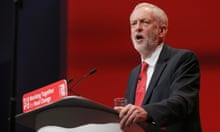



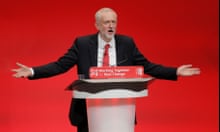
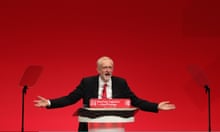
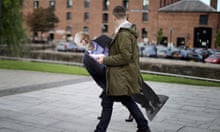

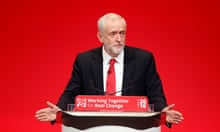
Comments (…)
Sign in or create your Guardian account to join the discussion